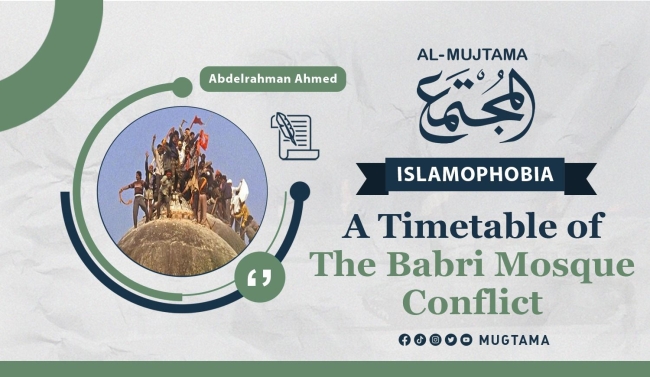Indian Prime Minister Narendra Modi inaugurated, on Monday, January 22, 2023, in the presence of thousands, a huge temple for the so-called "god Rama," according to Hindu beliefs, in the town of Ayodhya in the state of Uttar Pradesh, northern India, on the ruins of the historic Babri Mosque, thus turning a long chapter of the cultural heritage of Indian Muslims dating back to the beginning of the sixteenth century AD.
For many Indian Muslims contacted by "Al-Mujtama", the model of the town of Ayodhya, and what happened there of Hindu aspirations that turned a historic mosque into a temple, is not limited to this town alone. In many cities and villages of India, mosques are facing the same Hindu campaign. Hindus have a long list of thousands of mosques that they claim were built on the ruins of their temples. Therefore, they must reclaim the lands of these mosques and rebuild their temples anew, similar to the scenario of the Babri Mosque, according to what was mentioned by the Indian Islamic activist Dr. Zafarul Islam Khan.
The historic Babri Mosque was built in the sixteenth century. Still, it was subjected to a Hindu campaign over decades that led to its demolition in December 1992, and it ended with the inauguration of the huge temple representing the "Vatican of Hindus" on its ruins, after a long series of confrontations and legal disputes. According to their beliefs, the so-called "god Rama" was born at the site of the mosque about 7,000 years ago. So, what is the story?
Here is a timeline of the conflict between the mosque and the temple:
1528: Construction of the mosque was completed by the Mughal commander Mir Baqi during the reign of Mughal Emperor Babur.
1853: Conflict begins, with Hindus claiming Muslims demolished the Ram temple during Babur's rule, leading to clashes resulting in about 70 deaths.
1854: Conflict escalates, resulting in around 700 deaths as Hindus and British colonial forces confront Muslims protesting at the mosque site.
1859 : British colonial administration divides the mosque into two sections, allowing Muslims to pray inside the mosque and Hindus to worship in the outer courtyard.
1934: Mosque suffers damage due to renewed clashes between Muslims and Hindus over the killing of a cow.
1949: Hindu activists placed idols of Rama inside the mosque, leading to its closure by the government, claiming it as disputed property.
December 1949: The government closes the mosque and declares it disputed property, banning Muslims from praying there.
1950-1961: Legal suits filed by Hindus and Muslims seeking ownership rights over the mosque.
Mid-1980s: The Hindu nationalist party BJP exploits the issue politically, advocating for the demolition of the mosque and the construction of a temple.
1984: Extremist Hindu groups begin actively collecting funds and resources for building the temple.
February 1986: The Congress government allows the placing of foundation stone for the temple near the mosque.
September-October 1990: BJP leader Lal Krishna Advani leads a nationwide march advocating for the temple, resulting in riots and thousands of Muslim casualties.
December 6, 1992: Babri Mosque was demolished by Hindu mobs in Ayodhya.
December 7, 1992: Hindus establish a makeshift temple at the mosque site, guarded by police, denying Muslims access.
December 16, 1992: The central government forms a commission to investigate the mosque's demolition.
2003: Archaeologists begin excavations at the mosque site to ascertain the presence of a Hindu temple.
June 2009: The Commission submits its report, holding several BJP leaders and the RSS organization responsible for the mosque's demolition.
September 2010: Allahabad High Court orders partition of the mosque site between Hindus and Muslims, but both parties appeal the decision.
May 2011: Supreme Court suspends the partition ruling after appeals from both parties.
March 2017: Supreme Court proposes out-of-court settlement between Hindus and Muslims.
December 2017: Supreme Court holds hearings on the dispute.
January 2019: The Supreme Court forms a five-judge panel to hear the case.
March 2019: Supreme Court forms a mediation committee, but efforts fail.
August 2019: Supreme Court begins hearings on the dispute.
October 2019: Supreme Court concludes hearings and reserves judgment.
November 2019: Supreme Court rules in favor of Hindus, granting them land to build a temple and Muslims an alternate site for a mosque.
February 2020: Foundation stone laid for the temple.
September 2020: Court acquits senior BJP leaders of mosque demolition charges.
January 2024: Prime Minister Narendra Modi inaugurates the Ram Mandir temple built on the site of the historic Babri Mosque on Monday, January 22, 2024.
Source: Al-Mugtama


